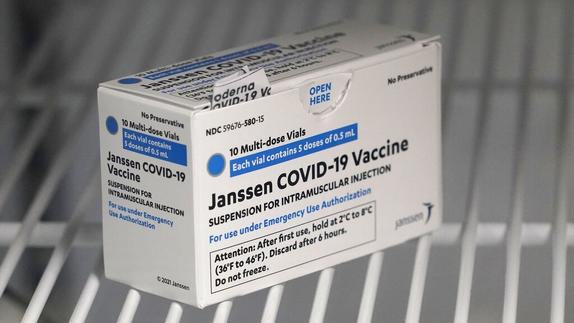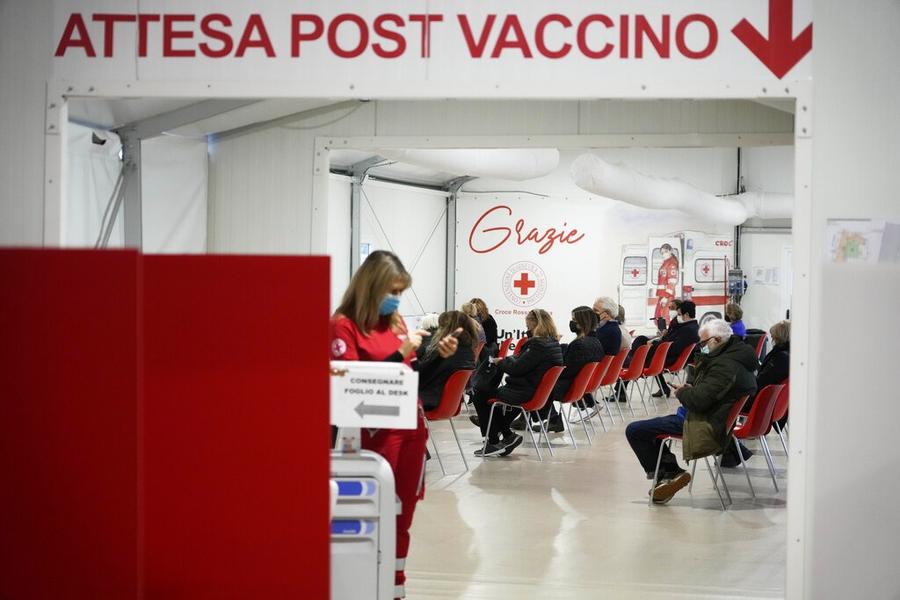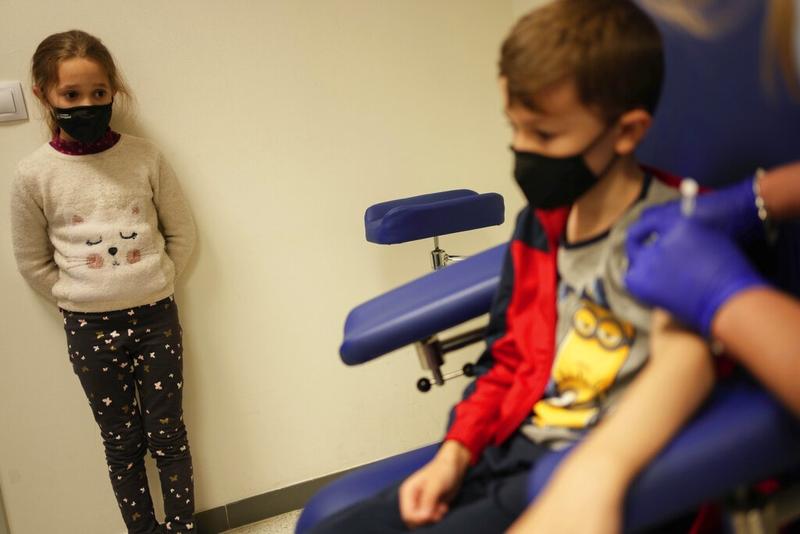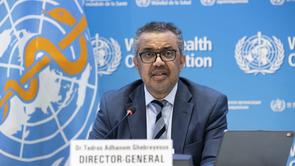 This photo shows a box of the Johnson & Johnson COVID-19 vaccine in a refrigerator at the Yakima Valley Farm Workers Clinic in Toppenish, Washington, March 25, 2021. (TED S. WARREN / AP)
This photo shows a box of the Johnson & Johnson COVID-19 vaccine in a refrigerator at the Yakima Valley Farm Workers Clinic in Toppenish, Washington, March 25, 2021. (TED S. WARREN / AP)
ATHENS / BERLIN / MADRID / ROME / LISBON / ZURICH / MILAN / DUBLIN / LA PAZ / BUENOS AIRES / GENEVA / MONTEVIDEO / OTTAWA / LONDON / COPENHAGEN / CAPE TOWN - A booster dose of Johnson & Johnson Inc's single-dose COVID-19 vaccine was 84 percent effective at preventing hospitalization in South African healthcare workers who became infected as the Omicron variant spread, researchers said on Thursday.
The real-world study, which has not been peer-reviewed, was based on a second dose of the J&J vaccine administered to 69,092 workers between Nov 15 and Dec 20.
An initial course of inoculation has been shown to offer only greatly reduced protection against infection by Omicron, which is spreading quickly through many countries after first being identified in late November in southern Africa and Hong Kong.
However, several studies have suggested that a booster dose provides significant protection against severe illness from the variant.
The South African study showed the J&J vaccine's effectiveness at preventing hospitalization rose from 63 percent shortly after a booster was administered to 84 percent 14 days later. Effectiveness reached 85 percent at one to two months post-boost.
"It reassures us that COVID-19 vaccines continue to be effective for the purpose they were designed, which is to protect people against severe disease and death," said Linda-Gail Bekker, the study's co-lead investigator.
"This is yet another piece of evidence that we have not lost that impact even in the face of a very mutated variant."
Bekker said the jury was "still out" on the issue of further boosters of the J&J shot.
"What we are showing is that two doses really restore full protection, and I don't think we can extrapolate from this that we are going to need a third or a fourth boost at all."
Researchers said their analysis had several limitations, including short follow-up times, which averaged eight days for healthcare workers who had received their boost within the previous 13 days, or 32 days for those boosted for 1-2 months earlier, and which could skew overall vaccine effectiveness.
Argentina
Argentina reached a daily record of new coronavirus on Wednesday with 42,032 people testing positive, according to the government, surpassing the previous all-time high of 41,080 cases registered in May.
The Health Ministry also said on Wednesday that 26 deaths occurred from the virus recorded over the previous 24 hours.
"We are at a very high level of contagion ... in the Federal Capital and Greater Buenos Aires the situation is serious," local doctor Rodrigo Salemi told television.
The nation of 45 million inhabitants has registered 5,556,239 cases and 117,111 deaths since the beginning of the pandemic, according to official data.
Bolivia
Bolivia reported late on Tuesday an all-time record of 4,934 new cases of COVID-19, as the omicron variant spreads worldwide but without any confirmed cases of the variant in the Andean nation.
"(This is) the worst epidemiological storm that we have lived through since the pandemic started," said Carlos Hurtado, a top health official in Santa Cruz, the country's most populated region and the most affected by the spread of the virus.
About 70 percent of Bolivians have been vaccinated against the virus. While South America is now the most-vaccinated region in the world, it also reported some of the worst death toll rates anywhere earlier in the pandemic.
Britain
Britain reported a new record increase of 183,037 coronavirus cases in the latest 24-hour period, bringing the total number of coronavirus cases in the country to 12,559,926, according to official figures released Wednesday.
The country also reported a further 57 coronavirus-related deaths. The total number of coronavirus-related deaths in Britain now stands at 148,089.
Another 39,923 Omicron cases have been confirmed in Britain, the biggest daily increase since the COVID-19 variant was detected in the country, taking the total Omicron cases found in the country to 210,122, the UK Health Security Agency (UKHSA) said Wednesday.
The latest data showed that more than 90 percent of community COVID cases in England are now Omicron.
 People enter a COVID-19 rapid testing business in Montreal on Dec 4, 2021. (GRAHAM HUGHES / THE CANADIAN PRESS VIA AP)
People enter a COVID-19 rapid testing business in Montreal on Dec 4, 2021. (GRAHAM HUGHES / THE CANADIAN PRESS VIA AP)
Canada
Canada reported 23,585 new COVID-19 cases Wednesday morning, the first time to record more than 20,000 cases on a daily basis, elevating the cumulative total to 2,094,042 cases with 30,231 deaths, according to CTV.
Daily cases have hit record highs in Canada recently as the new Omicron variant of COVID-19 races out of control, keeping workers at home and overwhelming testing centers.
Quebec province reported its highest daily COVID-19 case count on Wednesday with 13,149 new cases and 10 new deaths. The province's cumulative total surged to 572,419 cases with 11,702 fatalities.
Meanwhile, hospitalizations continue to rise at a quicker pace in the province, with a net increase of 102 and seven more intensive care beds occupied by COVID-19 patients while the test positivity rate rose to 28 percent, which means that more than one in four of all PCR tests in the province came back positive.
When the Omicron variant was discovered, the Quebec government said that 800 hospital beds across the province were reserved for COVID-19 patients in case of a major wave. On Wednesday, the province had a total of 804 patients in hospitals.
On Wednesday, the government listed the total hospital capacity for COVID-19 patients as 825 beds outside the ICU, and 210 ICU beds. It also reported that there was a total of 682 patients outside ICUs and 122 in ICUs.
Cuba
Cuba on Wednesday registered 241 new confirmed cases of the coronavirus in the past 24 hours, taking the national caseload to 965,243, the Ministry of Public Health said.
No coronavirus deaths were registered in the 24-hour period, keeping the pandemic death toll at 8,321.
ALSO READ: South Africa study suggests Omicron could displace Delta
Denmark
With a record number of 23,228 new COVID-19 cases reported in Denmark in the last 24 hours, health officials have urged citizens to "see as few people as possible" during the holiday season.
Among the cases reported are 1,205 reinfections, or about one in every twenty, according to statistics from the Statens Serum Institut (SSI) on Wednesday.
With only two days to go until New Year's Eve, the Director of Denmark's Health Authority (SST) Soren Brostrom strongly urged Danes to opt for quiet celebrations on the 31st.
"See as few people as possible, and keep it quiet," said Brostrom at a press conference.
 Only a few visitors stroll across the "Große Freiheit" on Hamburg's Reeperbahn, in Germany on Dec 23, 2021. (AXEL HEIMKEN / DPA VIA AP)
Only a few visitors stroll across the "Große Freiheit" on Hamburg's Reeperbahn, in Germany on Dec 23, 2021. (AXEL HEIMKEN / DPA VIA AP)
Germany
German Health Minister Karl Lauterbach said on Wednesday that the number of new coronavirus cases has been under-reported and the actual incidence rate of infections is about two or three times higher than the officially reported figure.
Lauterbach said the under-reporting was due to fewer tests being performed at workplaces and at doctors practices during the holiday season, as well as only a few of those test results being submitted to authorities.
Lauterbach also expressed concern about a clear rise in cases of the Omicron variant and appealed to people to celebrate the New Year only in small groups.
Der Spiegel magazine reported on Wednesday that Lauterbach is in favour of shortening quarantine periods over fears the country will soon grind to a halt given how many people are having to self-isolate protectively.
Germany's Robert Koch Institute (RKI) for infectious diseases currently recommends that infected people go into quarantine for 14 days, even if they are vaccinated or recovered.
The RKI on Wednesday reported 2,686 new cases of the variant, bringing the total number to 13,129. Four people have died with the variant.
The seven-day incidence rate, which has been a key metric for determining coronavirus policy, was reported as 205.5 cases per 100,000 residents, the lowest figure since early November.
A spokesperson for the German Health Ministry said earlier Wednesday that the government expects a clearer picture of the infection situation early next year.
"The number of infections is an important indicator, but of course it's not the only one," the spokesperson said.
The sinking incidence rate comes despite repeated warnings by health officials of an impending fifth wave of infections.
 A pedestrian wearing a face mask to protect against coronavirus walks in front of a mural, at a metro station in Athens, Greece on Nov 15, 2021. (THANASSIS STAVRAKIS / FILE / AP)
A pedestrian wearing a face mask to protect against coronavirus walks in front of a mural, at a metro station in Athens, Greece on Nov 15, 2021. (THANASSIS STAVRAKIS / FILE / AP)
Greece
Greece is introducing new restrictions on the hospitality sector from Thursday, bringing forward measures planned for early January as coronavirus infections surge.
Health authorities reported on Wednesday that daily confirmed COVID-19 cases had jumped by more than 7,000 to 28,828, a new all-time record, with 72 deaths.
Authorities said the Omicron variant, which is highly contagious, appeared to be dominant in the community, barely a month after it was first detected.
Bars, nightclubs and restaurants will be forced to close at midnight, with no standing customers and no music, with the exception of New Year's Eve when then can stay open until 2 am.
Restaurant and night club owners braced for a tough period ahead, expecting a hit on sales in the next months.
Authorities had also tightened curbs last week, mandating masks in open spaces and banning Christmas and New Year festivities in public places.
Health Minister Thanos Plevris told a news conference that if measures are fully complied with, it would allow a return to normality after mid-January.
Ireland
Ireland became the latest country to smash its previous record number of daily COVID-19 cases on Wednesday, reporting 16,428 new infections as those requiring treatment in hospital also began to rise, the health department said.
That topped the 11,182 reported on Dec 24 with the fast- spreading Omicron accounting for almost all cases and making tests hard to come by. There are 568 coronavirus patients in hospital, sharply up on the Dec. 25 two-month low of 378.
The number of COVID-19 patients in hospital peaked at just over 2,000 in January during Ireland's deadliest wave when a barely manageable 221 filled almost every intensive care bed in the country.
"All of the latest epidemiological indicators are a cause of concern. Given the very high levels of transmission nationwide, every individual should consider themselves potentially infectious, and strictly adhere to the public health measures," Chief Medical Officer Tony Holohan said in a statement.
 People wait at an Italian Red Cross anti COVID-19 vaccination hub, in Rome on Nov 29, 2021. (GREGORIO BORGIA / AP)
People wait at an Italian Red Cross anti COVID-19 vaccination hub, in Rome on Nov 29, 2021. (GREGORIO BORGIA / AP)
Italy
Italy on Wednesday scrapped self-isolation rules for those coming into contact with someone testing positive for coronavirus providing they have had a booster shot, have recently recovered or been vaccinated.
The move comes after health experts urged the government to rethink its policies amid worries that the spread of the highly contagious Omicron variant could paralyse the country by forcing millions to stay at home.
Under the Italian measures, isolation will no longer be required for those who had a positive contact but have had a booster dose, have been vaccinated or have recovered from the illness within the last 120 days, a Cabinet statement said.
They will have to wear a more protective Ffp2 (equivalent to KN95 or N95 in other regions) mask for 10 days and, only if they have symptoms, take a test within five days since the contact with the positive person.
"I think it is reasonable to apply different rules to those citizens who have followed the government's indications, taking two doses and then the booster," said health undersecretary Andrea Costa.
Italy reported another fresh record daily tally of COVID-19 cases on Wednesday, with new cases hitting 98,030 against 78,313 a day earlier, the health ministry said.
The number of coronavirus-related deaths fell to 148 from 202 on Tuesday.
Italy has registered 137,091 deaths linked to COVID-19 since its outbreak emerged in February last year, the second-highest toll in Europe after Britain and the ninth highest in the world. The country has reported 5,85 million cases to date.
Portugal
Portugal reported a new record of 26,867 coronavirus cases over the last 24 hours on Wednesday, up sharply from 17,172 the previous day, although daily deaths dropped to a fraction of early 2021 peaks.
Health authority DGS registered 12 fatalities, down from Tuesday's 19, while the number of patients in intensive care units was steady at 151.
In late January, the number of daily deaths exceeded 300 and there were more than 900 patients in intensive care.
Portugal has one of the world's highest COVID-19 vaccination rates with around 87 percent of its 10-million population fully inoculated, but the fast-spreading Omicron variant has caused the recent surge in cases, amplified by an increase in mass testing.
The 14-day infection rate jumped to 923 cases per 100,000 people from 804 reported on Tuesday.
 A young girl watches as a boy receives a vaccine as children are administered the first shot of the Pfizer COVID-19 vaccine at Hospital de Henares in Coslada, Madrid on Dec 15, 2022.(BERNAT ARMANGUE / AP)
A young girl watches as a boy receives a vaccine as children are administered the first shot of the Pfizer COVID-19 vaccine at Hospital de Henares in Coslada, Madrid on Dec 15, 2022.(BERNAT ARMANGUE / AP)
Spain
Spain on Wednesday reduced the isolation period for people who have tested positive for COVID-19 to seven days from 10, the health ministry said, even as new infections hit record highs.
The Spanish decision, taken unanimously at a meeting between Health Minister Carolina Darias and regional health chiefs, follows similar moves by other countries such as the United States and Britain.
A lack of staff due to long isolation times has caused disruptions to some industries even though many of those who test positive are asymptomatic.
The ministry also reduced the mandatory quarantine for close contacts of people who have tested positive to seven days. Separately, Darias said the number of people allowed to attend sporting events would also be slashed.
The national 14-day infection rate hit a new record of 1,360 cases per 100,000 people on Tuesday, rising from 1,206 cases the previous day and marking a five-fold increase since the beginning of December.
Switzerland
New COVID-19 infections in Switzerland hit a record high of 17,634 within the last 24 hours, figures published on the health authorities' COVID-19 dashboard showed on Wednesday.
Health Minister Alain Berset said he has spoken with President Guy Parmelin and the head of the regional health directors to discuss the worsening situation and had additional measures at the ready if need be, as hospitalizations are expected to increase.
"Omicron infections are increasing sharply," Berset said on Twitter. The variant is the dominant strain of COVID-19 in Switzerland, making up 58 percent of cases.
"The next package of measures - including closures - is ready," Berset added. "The government can decide quickly when more accurate data on the dangerousness of Omicron is available."
Berset also renewed calls for people to be vaccinated and get booster jabs. Switzerland has one of the lowest vaccination rates in western Europe, with 67 percent of its 8.6 million population fully vaccinated.
ALSO READ: Thousands of flights canceled as Omicron mars Christmas
 Patients wait to receive a COVID-19 vaccine booster shot at a mobile vaccination station on 59th Street below Central Park on Dec 2, 2021, in New York. (JOHN MINCHILLO / AP)
Patients wait to receive a COVID-19 vaccine booster shot at a mobile vaccination station on 59th Street below Central Park on Dec 2, 2021, in New York. (JOHN MINCHILLO / AP)
United States
The average number of daily confirmed coronavirus cases in the United States hit a record high of 258,312 over the past seven days, a Reuters tally showed on Wednesday, as US officials weigh the impact of the more transmissible Omicron variant.
The previous peak for the seven-day moving average was 250,141 confirmed cases recorded on Jan 8 of this year. Daily records were broken this week in at least seven European nations.
While some data from other countries showed less disease with Omicron, it was too early to gauge the impact across the United States, particularly given its uneven vaccination rates, CDC Director Rochelle Walensky said on Wednesday.
Still, she noted in a call with reporters that while the seven-day daily average of positive cases is up 60 percent over the previous week, the hospitalization rate for the same period is up only 14 percent, to about 9,000 per day. Deaths were down about 7 percent to 1,100 per day, she said.
The CDC released new guidance this week shortening the isolation period for people with a confirmed infection to five days from 10, so long as they are asymptomatic. The move was partly designed to ease staff shortages in hospitals, airlines and other vital services.
States showing the highest daily infection numbers on Tuesday included New York, which reported 40,780 cases, and California, which reported over 30,000. Texas reported more than 17,000 cases and Ohio over 15,000.
The Omicron variant was estimated to account for 58.6 percent of US infections as of Dec 25, according to CDC data released on Tuesday.
Uruguay
Uruguayan Public Health Minister Daniel Salinas on Wednesday confirmed the country's first cases of the Omicron variant of COVID-19.
Researcher Gregorio Iraola of the Pasteur Institute in Montevideo "has been able to confirm" that "the Omicron variant has entered our country," Salinas told reporters.
Uruguay registered 913 new cases of COVID-19 on Tuesday, the highest daily number since July 1, while active cases climbed from 4,230 to 4,820, the highest number since July 17.
The South American country has logged 408,894 cases of infection and 6,167 deaths during the pandemic.
 Tedros Adhanom Ghebreyesus, director general of the World Health Organization, talks to the media regarding the coronavirus and global health priorities in 2022, during a press conference at WHO headquarters in Geneva, Switzerland, on Dec 20, 2021. (SALVATORE DI NOLFI/KEYSTONE VIA AP)
Tedros Adhanom Ghebreyesus, director general of the World Health Organization, talks to the media regarding the coronavirus and global health priorities in 2022, during a press conference at WHO headquarters in Geneva, Switzerland, on Dec 20, 2021. (SALVATORE DI NOLFI/KEYSTONE VIA AP)
World Health Organization
The simultaneous circulation of the Delta and Omicron variants of the coronavirus is creating a "tsunami of cases", World Health Organization director-general Tedros Adhanom Ghebreyesus told a news briefing on Wednesday.
"Delta and Omicrom are now twin threats driving up cases to record numbers, leading to spikes in hospitalization and deaths," said Tedros.
"I am highly concerned that Omicron, being highly transmissible and spreading at the same time as Delta, is leading to a tsunami of cases."
Tedros repeated his call for countries to share vaccines more equitably and warned that the emphasis on boosters in richer countries could leave poorer nations short of jabs.
He said the WHO was campaigning for every country to hit a target of 70 percent vaccine coverage by the middle of 2022, which would help end the acute phase of the pandemic.
Meanwhile, the acute phase of the COVID-19 pandemic could end next year but the coronavirus will not disappear, the WHO's top emergency expert Mike Ryan said on Wednesday.
Ryan also said it was too early to draw conclusions on the severity of the Omicron variant until it had spread more widely to older people.



